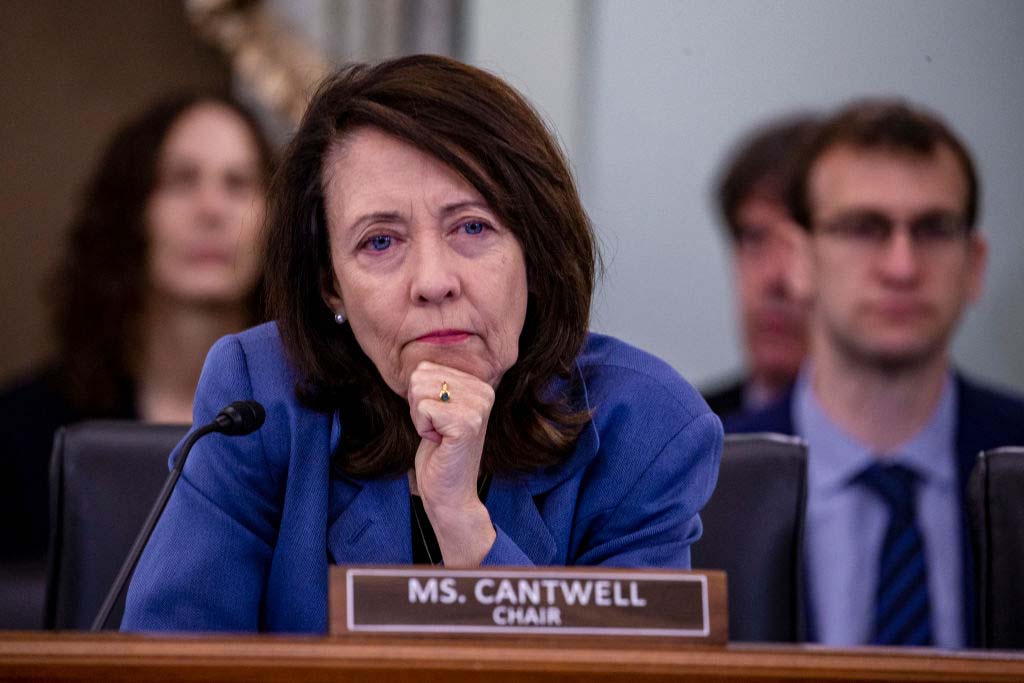
Congress continues to press the Federal Communications Commission on the issue of regulating streaming services as it does MVPDs, and it looks like a majority of commissioners and potential commissioners support at least a new look at the issue.
As FCC chair Jessica Rosenworcel suggested at a House oversight hearing Wednesday (June 21) that cable video-related regulation provided for in the 1984 and 1992 Cable Acts did not apply to online video providers, at a separate Senate Commerce Committee FCC nomination hearing Thursday (June 22), chair Maria Cantwell (D-Wash.) pressed the issue.
Cantwell pointed to a 2014 inquiry — led by then-FCC chair Tom Wheeler — into the agency’s authority to regulate online video, and said she would be sending a letter to Rosenworcel asking her to reopen that inquiry, specifically looking at whether online video services should be required to bargain in good faith with content providers, including broadcasters.
"I write to urge the FCC to update its record in Promoting Innovation and Competition in the Provision of Multichannel Video Programming Distribution Services, MB Docket No. 14-261, which sought comment on whether the definition of “multichannel video programming distributor” (MVPD) should be updated to reflect the growing amount of video services that are provided over the Internet," the letter reads, according to a copy supplied by Cantwell's office.
Cantwell asked nominee Anna Gomez and sitting commissioners Geoffrey Starks and Brendan Carr, who are up for renomination, if they would support reopening the inquiry. She suggested there was a need for good-faith bargaining regulations on streaming services to ensure broadcasters are fairly compensated for their content online. The FCC currently requires both broadcasters and MVPDs to negotiate in good faith for retransmission of broadcast signals on traditional video systems.
Cantwell said that given the rise of streaming services and decline in important local news, the FCC should look at whether there should be a regulatory structure in place to make sure broadcasters get a competitive price for their product, saying she hoped the FCC could “turn to those issues” at some point.
Asked if they would support refreshing the record, Gomez said she agreed local broadcast news was important and said that, if confirmed, she would work with the committee to understand the issue and “delve into” what the FCC can do “given current law.”
Starks, a Democrat, echoed Rosenworcel's caveat about the legislation authorizing the FCC's cable video regulations not anticipating streaming, but also said he took Cantwell’s point about the rise of streaming and supported exploring some new questions about the issue.
Carr, a Republican, said he would be “happy” to reopen the review if the chairwoman decides to do so.
Before quizzing the nominees, Sen. Marsha Blackburn (R-Tenn.) applauded Cantwell’s letter and supported reopening the 2014 FCC review of whether and how it could regulate online video.
In the letter to Rosenworcel, Cantwell said the refreshed inquiry “will help ensure that the Commission’s rules for video service remain relevant to the state of the industry today and are consistent with promoting the public interest in this vital sector, as well as provide an opportunity for fresh voices to weigh in and allow for a thorough analysis to help inform the FCC’s and Congress’s next steps.”
Cantwell told Rosenworcel that Congress should create a new copyright regime for linear TV streaming services so that broadcasters can more easily be compensated, but that the FCC did not have to wait around for Congress to get to it.
In the absence of that regime, she said, “linear television streaming services would be required to negotiate directly with local broadcasters under current good faith negotiation requirements of the Communications Act, which would lead to agreements that better reflect the value of broadcasters’ content.”
Not surprisingly, broadcasters were solidly behind the Cantwell effort.
“NAB is grateful to Chair Cantwell for her continued leadership to preserve and strengthen broadcasters’ valuable local journalism and public service in a shifting media landscape,” National Association of Broadcasters president and CEO Curtis LeGeyt said. “As every consumer recognizes, streaming platforms have drastically changed their ability to access local broadcast content. We echo Chair Cantwell’s call for the FCC to update its vMVPD [virtual MVPD] proceeding to examine this issue, and look forward to working closely with the Commission and lawmakers to inform their deliberations.”
“Nexstar believes Senator Cantwell makes a compelling case for closing the ‘streaming loophole’ and allowing local broadcasters to negotiate directly with over-the-top providers such as You Tube TV, Hulu, FuboTV and others,” Nexstar Media Group executive VP and chief communications officer Gary Weitman said following the hearing.







